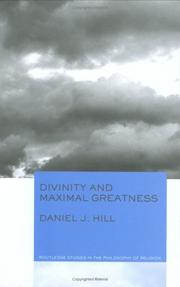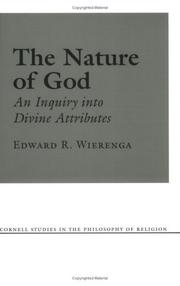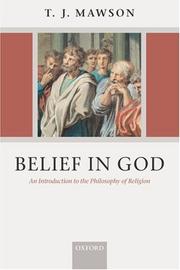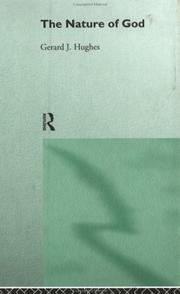| Listing 1 - 10 of 44 | << page >> |
Sort by
|

ISBN: 1134381263 0203495799 1280102845 0415591694 9780203495797 0415312884 9781134381210 9781134381258 9781134381265 9780415312882 9780415591690 1134381255 9781280102844 Year: 2005 Publisher: London ; New York : Routledge,
Abstract | Keywords | Export | Availability | Bookmark
 Loading...
Loading...Choose an application
- Reference Manager
- EndNote
- RefWorks (Direct export to RefWorks)
God --- Attributes of God --- Attributes.

ISBN: 0415312884 Year: 2005 Publisher: London Routledge
Abstract | Keywords | Export | Availability | Bookmark
 Loading...
Loading...Choose an application
- Reference Manager
- EndNote
- RefWorks (Direct export to RefWorks)
God --- Attributes --- Attributes of God

ISBN: 1501711652 9781501711657 0801422124 9780801422126 0801488508 9780801488504 Year: 2018 Publisher: Ithaca, NY : Cornell University Press,
Abstract | Keywords | Export | Availability | Bookmark
 Loading...
Loading...Choose an application
- Reference Manager
- EndNote
- RefWorks (Direct export to RefWorks)
The Nature of God explores a perennial problem in the philosophy of religion. Drawing upon developments in philosophy, most notably those in philosophical logic, Edward R. Wierenga examines the traditional divine attributes of omnipotence, omniscience, eternity, timelessness, immutability, and goodness. His philosophically defensible formulations of the nature of God are in accord with the views of classical theists. The author provides an account of each of the divine attributes by stating in contemporary terms what such classical theists as Augustine, Anselm, and Aquinas wrote about the nature of God; he then seeks to determine whether one can defend the ascription of traditional divine attributes to God against philosophical objections.Clearly written and comprehensive, The Nature of God contains a wealth of illuminating and original material on a central topic in the philosophy of religion
God (Christianity) --- Attributes of God --- Appropriation (Christian theology) --- Attributes. --- Attributes

ISBN: 0199276315 0199284954 019153479X 1281346187 1429460180 9780191534799 9781429460187 9781281346186 9780199284955 1383041970 Year: 2023 Publisher: Oxford : Oxford University Press,
Abstract | Keywords | Export | Availability | Bookmark
 Loading...
Loading...Choose an application
- Reference Manager
- EndNote
- RefWorks (Direct export to RefWorks)
Belief in God answers two questions: What, if anything, is it that Jews, Christians, and Muslims are agreeing about when they join in claiming that there is a God? and What, if any, prospects are there for rationally defending or attacking this claim? A highly accessible and engaging introduction to the philosophy of religion, this book offers full coverage of the key issues, from ideas about God's nature and character to arguments for and against his existence.
God (Christianity) --- God --- Attributes. --- Proof. --- Attributes of God --- Appropriation (Christian theology) --- Attributes --- Proof
Book
ISBN: 9781107087040 110708704X 9781316091807 9781107451810 1322560951 1316212157 131619180X 1316189961 1107451817 1316206602 1316210316 1316208451 1316204804 1316202968 1316091805 9781316191804 9781316204801 Year: 2014 Publisher: Cambridge : Cambridge University Press,
Abstract | Keywords | Export | Availability | Bookmark
 Loading...
Loading...Choose an application
- Reference Manager
- EndNote
- RefWorks (Direct export to RefWorks)
How do religious believers describe God, and what sort of attributes do they attribute to him? These are central topics in the philosophy of religion. In this book Graham Oppy undertakes a careful study of attributes which are commonly ascribed to God, including infinity, perfection, simplicity, eternity, necessity, fundamentality, omnipotence, omniscience, freedom, incorporeality, perfect goodness and perfect beauty. In a series of substantial chapters, he examines divine attributes one by one, and relates them to a larger taxonomy of those attributes. He also examines the difficulties involved in establishing the claim that understandings of divine attributes are inconsistent or incoherent. Intended as a companion to his 2006 book Arguing about Gods, his study engages with a range of the best contemporary work on divine attributes. It will appeal to readers in philosophy of religion.
God --- Dieu. --- Dieu --- Attributes --- Attributs. --- God. --- Attributes. --- Attributes of God --- Metaphysics --- Misotheism --- Theism
Book
ISBN: 9789004371293 900437129X 9004372512 Year: 2018 Publisher: Leiden Boston Brill
Abstract | Keywords | Export | Availability | Bookmark
 Loading...
Loading...Choose an application
- Reference Manager
- EndNote
- RefWorks (Direct export to RefWorks)
Miriam Ovadia offers a thorough discussion on the hermeneutical methodology applied in the theology of the Hanbalite traditionalistic scholar Ibn Qayyim al-Jawziyya (d. 1350), the most prominent disciple of the renowned Ibn Taymiyya (d. 1328). Focusing on Ibn al-Qayyim's voluminous - yet so far understudied - work on anthropomorphism, 'al-Sawa'iq al-Mursala', Ovadia explores his modus operandi in his attack on four fundamental rationalistic convictions, while demonstrating Ibn al-Qayyim's systemization of the Taymiyyan theological doctrine and theoretical discourse. Contextualizing al-Sawa'iq with relevant writings of thinkers who preceded Ibn al-Qayyim, Ovadia unfolds his employment of Kalamic terminology and argumentations; thus, his rationalized-traditionalistic authoring of a theological manifesto directed against his contemporary Ash'arite elite of Mamluk Damascus.
God (Islam) --- Attributes. --- Ibn Qayyim al-Jawzīyah, Muḥammad ibn Abī Bakr, --- Attributes of God
Book
ISBN: 9789004372511 9789004371293 9004372512 Year: 2018 Publisher: Leiden ;Boston Brill
Abstract | Keywords | Export | Availability | Bookmark
 Loading...
Loading...Choose an application
- Reference Manager
- EndNote
- RefWorks (Direct export to RefWorks)
In Ibn Qayyim al-Jawziyya and the Divine Attributes Miriam Ovadia offers a thorough discussion on the hermeneutical methodology applied in the theology of the Ḥanbalite traditionalistic scholar Ibn Qayyim al-Jawziyya (d. 1350), the most prominent disciple of the renowned Ibn Taymiyya (d. 1328). Focusing on Ibn al-Qayyim's voluminous – yet so far understudied – work on anthropomorphism, al-Ṣawāʿiq al-Mursala , Ovadia explores his modus operandi in his attack on four fundamental rationalistic convictions, while demonstrating Ibn al-Qayyim's systemization of the Taymiyyan theological doctrine and theoretical discourse. Contextualizing al-Ṣawāʿiq with relevant writings of thinkers who preceded Ibn al-Qayyim, Ovadia unfolds his employment of Kalām ic terminology and argumentations; thus, his rationalized-traditionalistic authoring of a theological manifesto directed against his contemporary Ashʿarite elite of Mamluk Damascus.
God (Islam) --- Attributes of God --- Attributes --- Ibn Qayyim al-Jawzīyah, Muḥammad ibn Abī Bakr,

ISBN: 1134809662 1280144033 9786610144037 0203981693 9780203981696 9780415109505 0415109507 9780415120753 0415120756 0415109507 0415120756 9781134809660 9781280144035 6610144036 9781134809615 9781134809653 1134809654 1852403594 Year: 1995 Publisher: London ; New York : Routledge,
Abstract | Keywords | Export | Availability | Bookmark
 Loading...
Loading...Choose an application
- Reference Manager
- EndNote
- RefWorks (Direct export to RefWorks)
Providing the reader with afirst-hand acquaintance of the religious philosophies of such classic writers as Aquinas and Hume, Hughes goes on to discuss their arguments in the light of current debates.
God --- Metaphysics --- Misotheism --- Theism --- Attributes of God --- Attributes. --- Attributes --- History of doctrines.
Book
ISBN: 1317491904 1315711427 1280120096 9786613523990 1844654796 9781844654796 9781317491903 1844652467 1844652475 9781844652464 9781844652471 9781315711423 9781280120091 6613523992 9781317491880 9781317491897 Year: 2011 Publisher: Durham : Acumen,
Abstract | Keywords | Export | Availability | Bookmark
 Loading...
Loading...Choose an application
- Reference Manager
- EndNote
- RefWorks (Direct export to RefWorks)
Are there adequate reasons to think that God exists? And, if God exists, what is God like? Jay Wood examines these two foundational questions about God, which have exercised philosophers since antiquity. The first part of the book addresses epistemological concerns, focusing on arguments for and against the claim that theism is rationally justifiable. Metaphysical questions about Gods nature, in particular Gods knowledge and power, constitute the second part of the book. Both questions are shown to be related since, if the concept of a God perfect in wisdom, power and goodness is incoherent, it cannot be reasonable to believe that God exists. Wood offers readers a clear and incisive assessment of the core philosophical arguments for the existence of God that will equip the reader with the necessary understanding to tackle more specialized and complex questions in the philosophy of religion.
God --- Theism. --- Attributes of God --- Philosophy --- Religion --- Atheism --- Misotheism --- Panentheism --- Proof. --- Attributes.
Book
ISBN: 1108617840 1108580815 1108598102 1108468330 9781108617840 9781108580816 9781108598101 Year: 2019 Publisher: Cambridge, England : Cambridge University Press,
Abstract | Keywords | Export | Availability | Bookmark
 Loading...
Loading...Choose an application
- Reference Manager
- EndNote
- RefWorks (Direct export to RefWorks)
The Divine Attributes explores the traditional theistic concept of God as the most perfect being possible, discussing the main divine attributes which flow from this understanding - personhood, transcendence, immanence, omnipresence, omniscience, omnipotence, perfect goodness, unity, simplicity and necessity. It argues that the atemporalist's conception of God is to be preferred over the temporalist's on the grounds of perfect being theology, but that, if it were to be the case that the temporal God existed, rather than the atemporal God, He'd still be 'perfect enough' to count as the God of Theism.
God (Christianity) --- Attributes of God --- Appropriation (Christian theology) --- Attributes. --- Philosophical theology.
| Listing 1 - 10 of 44 | << page >> |
Sort by
|

 Search
Search Feedback
Feedback About UniCat
About UniCat  Help
Help News
News